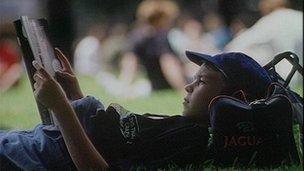Literacy: Fewer children reading in spare time, research suggests
- Published
- comments

Reading is most popular among eight to 11-year-olds, the survey suggests
Fewer children across the UK are reading in their own time and one in five is embarrassed to be caught with a book, a survey suggests.
Just over a quarter of 35,000 children from 188 schools told the National Literacy Trust that they read outside of school.
About the same number said they did not think their parents cared if they read.
The trust says a similar survey in 2005 found one in three children read in their own time.
The survey for the trust involved children filling in online questionnaires last winter.
Half of those taking part said they enjoyed reading either "very much" or "quite a lot" and a high proportion (four out of five) agreed with the statement "the more I read, the better I become".
Nearly two in five agreed reading was "cool", but about one in three said they only read when they had to.
'Literacy heroes' search
Report author Christina Clark, from the Literacy Trust, said young people who enjoyed reading very much were four times as likely to read above the level expected for their age compared with those who did not enjoy reading at all.
Those who read outside of class every day were five times as likely to read above the expected level compared with those who never did.
And children who do not think "reading is cool" were four times more likely to be below-average readers, the report says.
National Literacy Trust director Jonathan Douglas said: "Our research not only reveals that children are reading less and developing more negative attitudes towards reading, but also that there is a clear correlation between this and their performance in reading tests."
The study, of children aged from eight to 16, found that the proportion who read e-books outside of school had doubled since 2010 to 12%.
Reading is most popular among eight to 11-year-olds, the survey suggests, although teenagers are more likely to read for longer.
The charity released the research to coincide with a new campaign to find the UK's "literacy heroes"., external
It is asking the public to name people who might have inspired a love of books or helped to improve reading skills.
Anyone from a parent, teacher or young person who has overcome a personal literacy problem to a favourite author or celebrity can be nominated, the Literacy Trust said.
The campaign is being supported by the Duchess of Cornwall, who said: "I firmly believe in the importance of igniting a passion for reading in the next generation.
"In a world where the written word competes with so many other calls on our attention, we need more literacy heroes to keep inspiring young people to find the pleasure and power of reading for themselves."
- Published11 September 2013
- Published8 July 2013
- Published16 May 2013
- Published7 September 2012